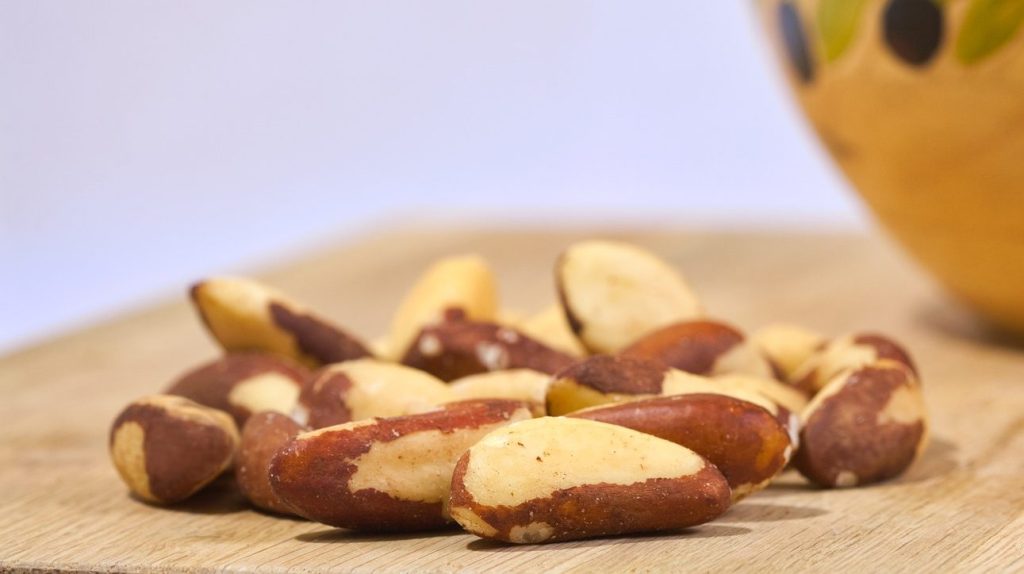Where do vegans get selenium? Vegan selenium sources are pretty easy to find depending on which geographical region you live in. If you happen to live in a region where selenium is harder to find, you might be at risk of developing a selenium deficiency.
Selenium is crucially important for proper thyroid function and the metabolism of thyroid hormones. Selenium also is important for reproduction and helps to make DNA and protect against cell damage and infections.(1)
Symptoms of selenium deficiency include nausea, vomiting, headaches, confusion, lethargy, seizures, and male infertility.(1)
Daily Recommendations
Nutritional recommendations for selenium and other nutrients are developed by the National Academy of Medicine (formerly the Institute of Medicine) to plan and assess the nutrient intakes of healthy people.
Recommended Daily Allowance (RDA) for Selenium:
| Age | Male | Female | Pregnancy | Lactation |
|---|---|---|---|---|
| 0–6 months* | 15 mcg | 15 mcg | ||
| 7–12 months* | 20 mcg | 20 mcg | ||
| 1–3 years | 20 mcg | 20 mcg | ||
| 4–8 years | 30 mcg | 30 mcg | ||
| 9–13 years | 40 mcg | 40 mcg | ||
| 14–18 years | 55 mcg | 55 mcg | 60 mcg | 70 mcg |
| 19–50 years | 55 mcg | 55 mcg | 60 mcg | 70 mcg |
| 51+ years | 55 mcg | 55 mcg |
Recommended Dietary Allowance (RDA): average daily intake of a nutrient that’s sufficient to meet the nutrient requirements of nearly all (97%–98%) healthy people.
Adequate Intake (AI): approximate intake assumed to be nutritionally adequate based on limited research, though still not enough evidence to develop an RDA.
Tolerable Upper Intake Level (UL): maximum daily intake that’s unlikely to cause adverse health effects.
The Tolerable Upper Intake Level (UL) for selenium is 400 mcg per day for teens and adults.(1)
Symptoms of selenium toxicity include a garlic odor in the breath, metallic taste in the mouth, hair loss, brittle nails, tremors, lightheadedness, kidney failure, and even death.(1)
How to Absorb More Selenium on a Vegan Diet
Selenium and iodine work together to keep your thyroid gland healthy. Too much of one can cause a deficiency in the other.
By maintaining recommended intakes for each of these minerals, you likely won’t have to worry about a deficiency of either one.
Best Vegan Sources of Selenium
The amount of selenium in foods depends on the amount of selenium present in the soil they’re grown in. The amount of selenium in soil varies by geographical region, which means it can be more difficult for people living in certain regions to get enough selenium from their diet.(1, 2)
Generally, people living in the United States and Canada have a lower risk of selenium deficiency because the selenium content of the soil in these regions tends to be higher. Areas of the world with generally low levels of selenium include New Zealand and certain regions in China and Europe.(1, 2)
Fortunately, many low-selenium regions import food from higher-selenium regions or add selenium to fertilizers. Many foods are fortified with selenium as well.(1)
The best vegan selenium source is hands down the Brazil nut.
Top vegan sources of selenium are:
- Brazil nuts
- Couscous
- Whole wheat pasta
- Sunflower seeds
- Chia seeds
- Soybeans
- Oatmeal
- Firm tofu
- Whole wheat bread
Keep in mind, the selenium content of these foods depend on where they were grown, but generally the vegan selenium sources listed here are higher in selenium than other sources.
Vegans & Selenium Supplements
Because of the import and export of foods from different regions, it’s not always easy to tell whether you’re getting too little or too much selenium.
Most vegans in the U.S. and other high-selenium areas that eat a variety of foods like whole grains and beans are likely to get enough selenium through their diet and don’t need to supplement.(1, 2)
Vegans in low-selenium areas may benefit from incorporating Brazil nuts into their diet or using a supplement with a moderate dose of selenium.
Disclaimer: The contents of this website are for educational purposes and are not intended to offer personal medical advice. To make sure your diet is providing you with the correct amount of nutrients your body needs, be sure to consult a nutrition specialist (ie: registered dietitian) with expertise in vegan diets.

